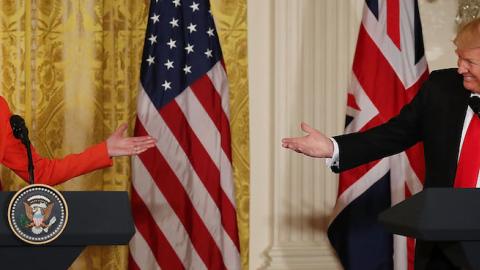On Friday, as his first major step in foreign policy, President Trump will receive British Prime Minister Theresa May at the White House. The meeting, which will begin the process of outlining a bilateral free-trade agreement, is a concrete expression of what “America First” means.
President Obama warned the British people last April that if they voted to leave the European Union, they wouldn’t receive preferential economic treatment from the U.S. As for a bilateral free-trade agreement, he said the British would be relegated to “the back of the queue.” Mr. Trump disagreed. “The U.K. has been such a great ally for so long,” he said on June 24, the day after Brexit passed. “They will always be at the front of the line.”
The early arrival of Ms. May proves the new president is true to his word. A bilateral free-trade agreement with the U.K., if struck, would serve as Mr. Trump’s model for future bilateral deals with other countries. Equally important is the transformative effect a deal with Britain will likely have on the EU.
Mr. Trump’s goal is to improve significantly Britain’s position in its exit negotiations with its Continental partners. Ms. May wants a Brexit that will secure the UK’s access to the European market without its having to abide by European economic regulations or immigration rules. Germany, as leader of the EU, fears that letting Britain have its cake and eat it too would encourage others nations to leave the union. Chancellor Angela Merkel therefore insists that the benefits of EU membership are inextricably connected to the obligations.
At stake are two different models of Western cooperation: integration versus solidarity. Under the integration model, with the EU being a prime example, countries cede key elements of their sovereignty to transnational organizations run by technocrats who are not directly accountable to voters. Under the solidarity model, national governments, which must answer to voters, maintain their independence as they enter into cooperative ventures that are subject to periodic revision as conditions change.
These rival visions threaten to place Mr. Trump and Ms. Merkel on a collision course. Sigmar Gabriel, who will be take the reins Friday as Germany’s new foreign minister, has criticized Mr. Trump’s inaugural address for its “highly nationalistic” tone, which reminded him of “the political rhetoric of the conservatives and reactionaries of the 1920s.”
Mr. Trump’s preference for the solidarity model is indeed the logical consequence of his support for nationalism. But the view that nationalism is a form of bigotry leading inevitably to tyranny—an idea as common on American campuses as it is in the German government—is overly simplistic. Nationalism can run amok, as it certainly did in the run-up to both World War I and World War II. The Germans especially are wise to remain vigilant against its excesses.
At the same time, political freedom is historically the direct offshoot of nationalism. The American people rejected the British crown precisely because they felt that it had trampled the inalienable rights of the individual. In Europe the process by which peoples asserted their sovereignty was intimately bound up with the rise of nations in the early modern period.
European integrationists—and American elites—ignore this dimension of Western history at their peril. The vote for Brexit is stunning proof that transnationalism, too, can overreach. In some ways the British rejection of the EU was a bigger upset than Mr. Trump’s victory. In the end, the Republican establishment got behind its party’s nominee. In Britain, all the major political organizations and the big media fought tooth and nail to defend the EU, but the British people, in a stunning demand for popular sovereignty, had other ideas.
That Trump supporters and Brexiteers rose up at the same moment to defy all expectations is no coincidence. This is no transitory phase, and anyone who suggests so is missing the depth of the historical forces at work. It was British and American nationalism that saved Europe in World War II. Today that same nationalism has the potential to revitalize the European order, which is failing in part because it lacks democratic legitimacy.
The simple fact is that one can be a nationalist and simultaneously be an internationalist committed to peaceful order. A recalibration of Europe away from the integration model and toward solidarity can serve that end.
Mr. Trump and Ms. May, like Ronald Reagan and Margaret Thatcher before them, represent a rejection of decades of tired wisdom about governance in the West. Instead of contributing to the disintegration of the trans-Atlantic partnership, their meeting has the potential, once again, to begin its reinvigoration.

















